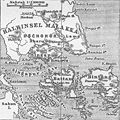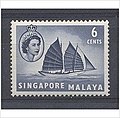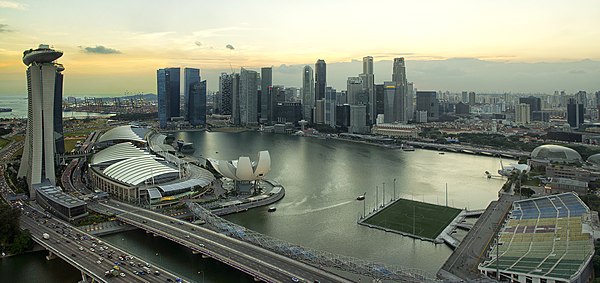Portal:Singapore
 Map of Singapore Singapore, officially the Republic of Singapore, is an island country and city-state in maritime Southeast Asia. The country's territory comprises one main island, 63 satellite islands and islets, and one outlying islet. It is about one degree of latitude (137 kilometres or 85 miles) north of the equator, off the southern tip of the Malay Peninsula, bordering the Strait of Malacca to the west, the Singapore Strait to the south along with the Riau Islands in Indonesia, the South China Sea to the east, and the Straits of Johor along with the State of Johor in Malaysia to the north.
Singapore's history dates back at least eight hundred years, having been a maritime emporium known as Temasek and subsequently a major constituent part of several successive thalassocratic empires. Its contemporary era began in 1819, when Stamford Raffles established Singapore as an entrepôt trading post of the British Empire. In 1867, Singapore came under the direct control of Britain as part of the Straits Settlements. During World War II, Singapore was occupied by Japan in 1942 and returned to British control as a separate Crown colony following Japan's surrender in 1945. Singapore gained self-governance in 1959 and, in 1963, became part of the new federation of Malaysia, alongside Malaya, North Borneo, and Sarawak. Ideological differences led to Singapore's expulsion from the federation two years later; Singapore became an independent sovereign country in 1965. After early years of turbulence and despite lacking natural resources and a hinterland, the nation rapidly developed to become one of the Four Asian Tigers. As a highly developed country, it has one of the highest GDP per capita (PPP) in the world. It is also identified as a tax haven. Singapore is the only country in Asia with a AAA sovereign credit rating from all major rating agencies. It is a major aviation, financial, and maritime shipping hub and has consistently been ranked as one of the most expensive cities to live in for expatriates and foreign workers. Singapore ranks highly in key social indicators: education, healthcare, quality of life, personal safety, infrastructure, and housing, with a home-ownership rate of 88 percent. Singaporeans enjoy one of the longest life expectancies, fastest Internet connection speeds, lowest infant mortality rates, and lowest levels of corruption in the world. It has the third highest population density of any country in the world, although there are numerous green and recreational spaces as a result of urban planning. With a multicultural population and in recognition of the cultural identities of the major ethnic groups within the nation, Singapore has four official languages: English, Malay, Mandarin, and Tamil. English is the common language, with exclusive use in numerous public services. Multi-racialism is enshrined in the constitution and continues to shape national policies in education, housing, and politics. Singapore is a parliamentary republic in the Westminster tradition of unicameral parliamentary government, and its legal system is based on common law. While the country is de jure a multi-party democracy with free elections, the government under the People's Action Party (PAP) wields widespread control and political dominance. The PAP has governed the country continuously since full internal self-government was achieved in 1959, and holds a supermajority in Parliament. One of the five founding members of ASEAN, Singapore is also the headquarters of the Asia-Pacific Economic Cooperation Secretariat, the Pacific Economic Cooperation Council Secretariat, and is the host city of many international conferences and events. Singapore is also a member of the United Nations, the World Trade Organization, the East Asia Summit, the Non-Aligned Movement, and the Commonwealth of Nations. (Full article...)Selected article -The Cabinet of Singapore forms the executive branch of the Government of Singapore together with the president. It is led by the prime minister who is the head of government. The prime minister is a Member of Parliament (MP) appointed by the president who in the president's judgment is likely to command the confidence of the majority of the Members of Parliament (MPs). The other ministers in the Cabinet are Members of Parliament appointed by the president acting in accordance with the advice of the prime minister. Ministers are prohibited from holding any office of profit and from actively engaging in any commercial enterprise. The Cabinet has the general direction and control of the Government and is collectively responsible to Parliament. It also has significant influence over lawmaking. Ministers may be designated by the prime minister to be in charge of particular ministries, or as ministers in the Prime Minister's Office. Singapore's ministers are the highest paid in the world. Prior to a salary review in 2011, the prime minister's annual salary was S$3.07 million, while the pay of ministerial-level officers ranged between S$1.58 million and S$2.37 million. On 21 May 2011, a committee was appointed by the prime minister to review the salaries of the prime minister as well as the president, political appointment holders, and Members of Parliament. Following the recommended wage reductions by the committee which were then debated and subsequently accepted in Parliament, the prime minister's salary was reduced by 36% (includes the removal of his pension) to S$2.2 million. Nonetheless, the prime minister remains the highest-paid political leader in the world. (Full article...)Selected picture Biopolis, a research and development centre for biomedical sciences located at one-north in Buona Vista, Singapore. Read more... General imagesThe following are images from various Singapore-related articles on Wikipedia.
Selected biography -Reginald Hugh Hickling, CMG, QC (2 August 1920 – 11 February 2007), known as Hugh Hickling, was a British lawyer, civil servant, law academic, and author, and author of the controversial Internal Security Act of colonial Malaysia. Born in Derby, England, Hickling served from 1941 until 1946 in the British Royal Navy during World War II, and then joined the Colonial Legal Service. In 1955, Hickling was posted to Malaya (now Malaysia), where he gained prominence as a lawmaker. He drafted the Constitution of Malaysia, and as Commissioner of Law Revision wrote the Internal Security Act (ISA) of 1960, which provided for the detention of persons without trial. The ISA was later used to suppress political opponents or those dedicated to non-violent activities, which Hickling later said was not his intention. (Full article...)Did you know (auto-generated)
In this month
More did you know -
Related portalsSoutheast Asia Other Countries Tasks
CategoriesWikiprojectsAssociated WikimediaThe following Wikimedia Foundation sister projects provide more on this subject:
Discover Wikipedia using portals |






























































